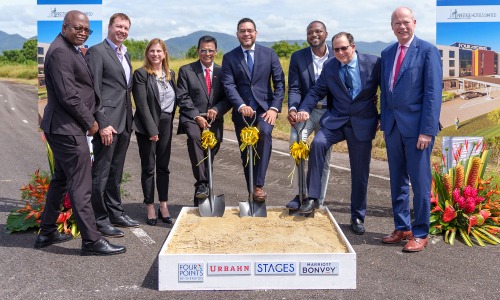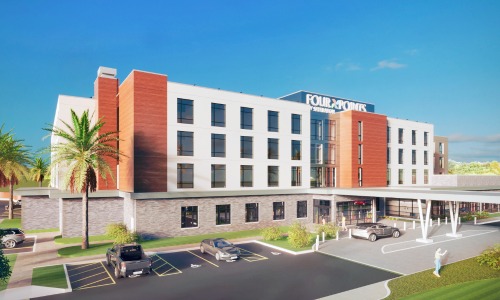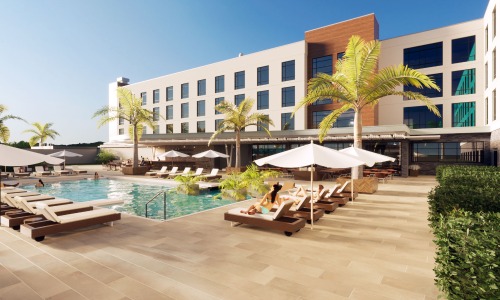
Piarco, Trinidad and Tobago Developers and designers STAGES Group and Urbahn Architects, who are the founders of Prestige Hotels Limited, investor SEAF Caribbean SME Growth Fund, Airports Authority of Trinidad and Tobago (AATT), and political leaders held a groundbreaking ceremony to mark the beginning of construction of a new Four Points by Sheraton hotel and conference center at the International Airport Estates at the Piarco International Airport. Prestige Hotels Limited is the owner and asset manager of the upcoming Four Points by Sheraton, which will be the first hotel to operate within the grounds of one of Trinidad and Tobago’s two main airports.
Prestige Hotels Limited is 70% owned by STAGES Group and 30% by Urbahn Architects. STAGES Group, through its affiliate, STAGES Consulting Engineers Ltd., with offices in Trinidad and Tobago, Jamaica, and Guyana, is the lead developer, investor, construction manager, and MEP engineer for the new hotel. Urbahn Architects of New York City is co-developer, co-investor, and architect. Washington, D.C.-based SEAF, via its SEAF Caribbean SME Growth Fund, is an additional equity partner. The partners have provided 40% of the capital cost of the project as equity. Debt financing of 60% of the project cost will be facilitated by a consortium of several Caribbean-based and international financial institutions. Marriott International, which owns the Four Points by Sheraton brand, will serve as property manager.
The new hotel will be the first hospitality project in Trinidad and Tobago to be developed in compliance with the Environmental, Social, and Governance (ESG) international ethical business conduct and responsible investment standards.
The project is located a mere 800 feet from the airport terminal, offering convenience and service geared toward business travelers and air crews visiting the two-island nation. The hotel will serve as the anchor tenant and first component to operate within the new 167-acre International Airport Estates, also known as the North Aviation Business Park. It will ultimately contain distinct zones for hotels, international trade, entertainment, offices, retail, warehousing and cargo facilities, and aviation services. The development site is the first parcel to be developed within the International Airport Estates. The Ministry of Tourism, Culture and the Arts, via its agency, Trinidad Tourism Limited (TTL), has granted tax and custom duty incentives for the development in accordance with the Tourism Development Act.
“As a Trinidad and Tobago-based business, we are proud to lead the team of local and international investors, designers, and manufacturers, who will bring this $25 million project to a successful completion. Upon opening, expected in early 2025, this hotel property will predominantly serve business travelers, air crews, transit passengers, tourists, and guests of international and local events and conferences,” said Tamarco Edwards, deputy chairman and founder of STAGES Group.
“The architecture of the new 154-room, four-story hotel will reflect local aesthetic preferences and materials, while complying with the Four Points by Sheraton brand design standards. The Caribbean-specific elements will include roof canopies, rosewood exterior panels, and locally sourced blue limestone finishes. An outdoor dining and lounging areas will also reference the Trinidad and Tobago’s love of outdoor entertaining,“ said Urbahn Principal Natale Baranco, AIA, LEED AP.
“SEAF is proud to partner with STAGES Group and Urbahn Architects in bringing international best practices in real estate development and construction to Trinidad and Tobago and the Caribbean, particularly in the areas of energy efficiency and resilient design. The Four Points by Sheraton hotel is the first of what we hope are many more future joint projects between SEAF's Caribbean-focused private equity fund, STAGES and Urbahn," said Hubertus Jan van der Vaart, co-founder and chief investment officer of SEAF.
“Our vision is to construct a facility which concurrently enhances the business traveller and tourism experience by creating a business centre and an overnight oasis,” said Inskip Pollonais, chairman of Prestige Hotels Ltd. and of STAGES Group Inc.
GSAL Designs Ltd. of Trinidad and Tobago serves as the local architectural partner. Twelve Thirteen ID of Atlanta, GA is the hospitality design consultant; FoodStrategy Inc. of Rockville, MD provides food services consulting; and the Dominican Republic-based ReCua is the landscape architect.


The approximately eight-acre hotel site, located at the southwest corner of the park adjacent to the Oropuna River, was acquired from AATT under a 99-year lease. The Authority has already extended the infrastructure connections to the lot. The hotel will operate a guest shuttle service to and from the airport.
Piarco International Airport (IATA: POS, ICAO: TTPP) is an international airport serving the island of Trinidad and is one of two international airports in Trinidad and Tobago. The airport is located 30 kilometers (19 miles) east of Downtown of Port of Spain, in the town of Piarco. It is the seventh busiest airport in the Caribbean in terms of passengers served. The airport is also the primary hub and operating base for the country's national airline, as well as the Caribbean's largest airline, Caribbean Airlines.
The four-story building plan is L-shaped, wrapped around the outdoor amenity and pool areas. On the first floor, a double height space extending the full depth of the building, housing the lobby and restaurant, will be framed with large windows on the east and west building facades to offer views of the outdoor dining section, pool, and main entrance.
A 4,574 s/f conference, convention and banquet facility with flexible meeting rooms and a glass walled pre-function space, as well as a fitness center, will both be located adjacent to the lobby. The food and beverage facilities will include a full-service restaurant with private and al fresco dining options, and two full-service bars, including a 20 seat covered exterior pool bar. The exterior private courtyard will have a multi-depth level pool and hot tub set within landscaped surroundings.
Guest rooms will complete the remainder of the first-floor plan, as well as the upper floors. On the second floor, guest room on either side of the lobby will be connected by a glass-enclosed bridge that will span over the double height space. There will be a total of 154 guest rooms.
“Exterior finishes mirroring the local landscape will be used for the façade, in a combination of sand and bronze toned stucco, silver aluminum composite material (ACM) panels, composite cladding in a rosewood finish, and locally sourced limestone veneer,” said Urbahn Associate Ryan Bieber, LEED AP.
Aluminum framework, developed by the Columbian manufacturer FORSA SA, will be used to accelerate the installation of the lightweight concrete structure. According to STAGES project director Gerald Lodie, “The majority of the building will be constructed utilizing load bearing integral concrete core floor and wall units that will be standardized based on the dimensions of each guest room type. In addition, concrete beams and columns will be utilized for larger span and specialized spaces on the first floor.”
Engineers at FORSA used the design documents to produce customized U-shaped tunnel forms, including cutouts for doors and windows, that will enable the floors and walls to be installed as one monolithic pour. The roof structure, as well as the canopies above street level, will also be installed utilizing the aluminum frames. The building will sit on grade, bearing on strip footing foundations.
“The FORSA technology provides a uniform, light-weight, and smooth-faced concrete structural system. It also accelerates the construction process, making it financially and technologically beneficial for multi-story buildings, such as the new Four Points by Sheraton hotel,” said STAGES senior project manager Martinez Montrose, MCIOB.
The hotel is designed to meet the international Greenkey hotel certification criteria. The property will feature an extensive rooftop solar panel array, which will provide a significant portion of the hotel’s energy demand.
The Urbahn and STAGES teams employed design technologies, including building information modeling (BIM), WUFI dynamic simulations of coupled heat and moisture transfers, and thermal modeling for energy. These efforts aided in maintaining the highest design, construction and operations standards required by Marriott International’s 360 sustainability and social impact program; the Environmental, Social, and Governance (ESG) guidelines, and the Greenkey hotel certification criteria, as well as the local Town and Country Planning Division requirements.
The substantial array of photovoltaic solar panels on the building’s south-facing roof will provide energy for the hotel’s hot water system and onsite electric vehicle charging ports.
During construction, the FORSA concrete formwork technology will minimize construction waste and provide a high degree of extreme weather resiliency. The usage of locally sourced building and decorative materials throughout will help reduce the building’s carbon footprint.
